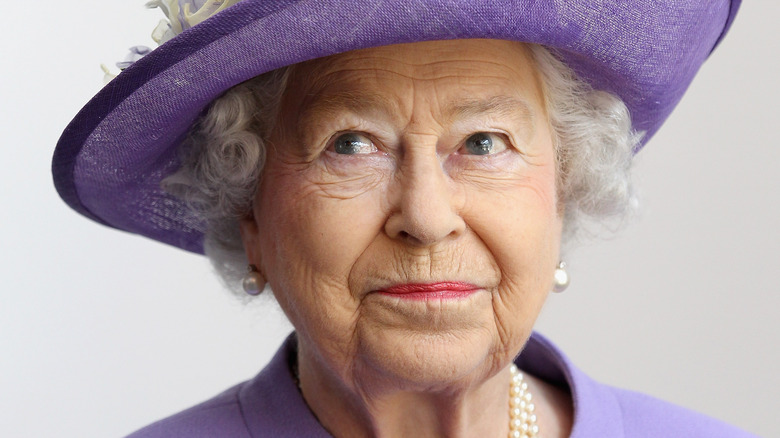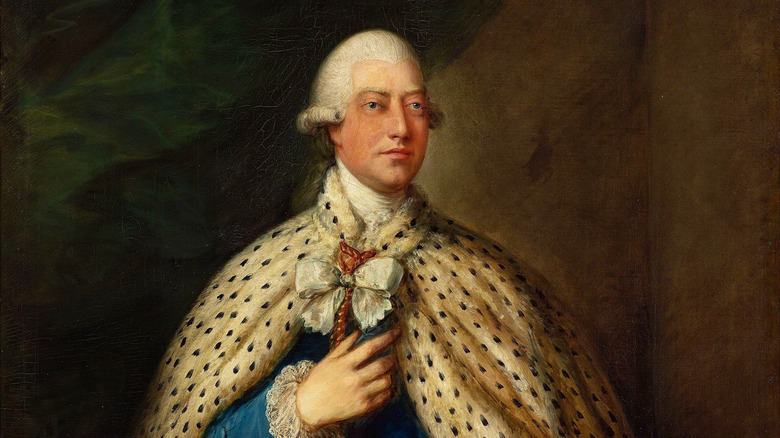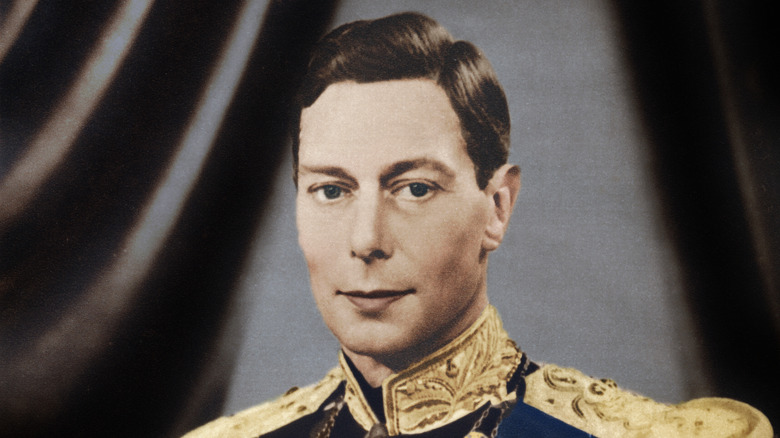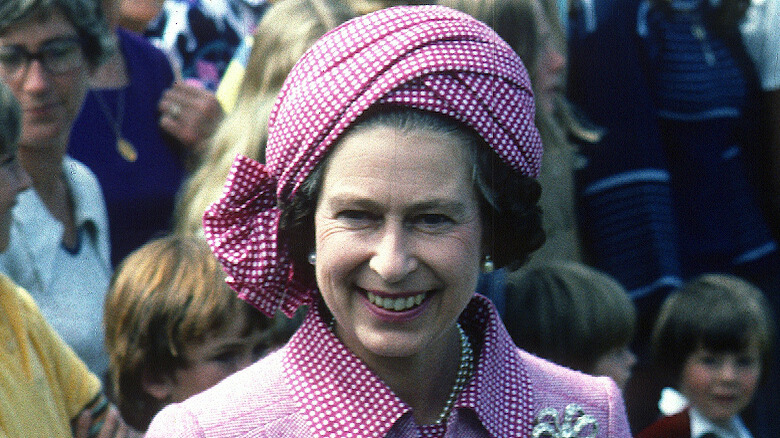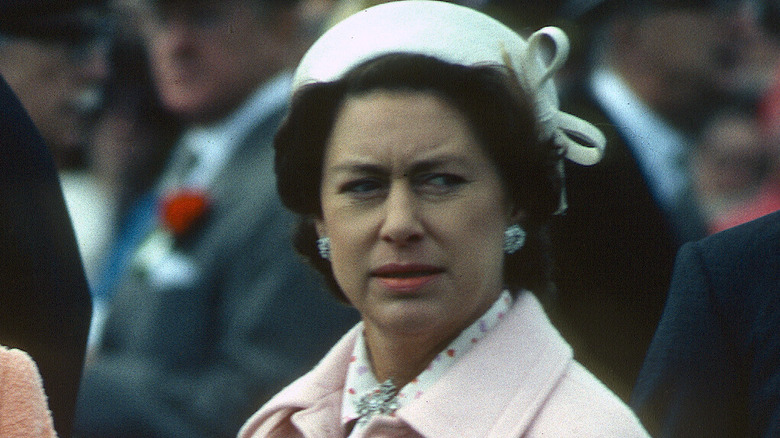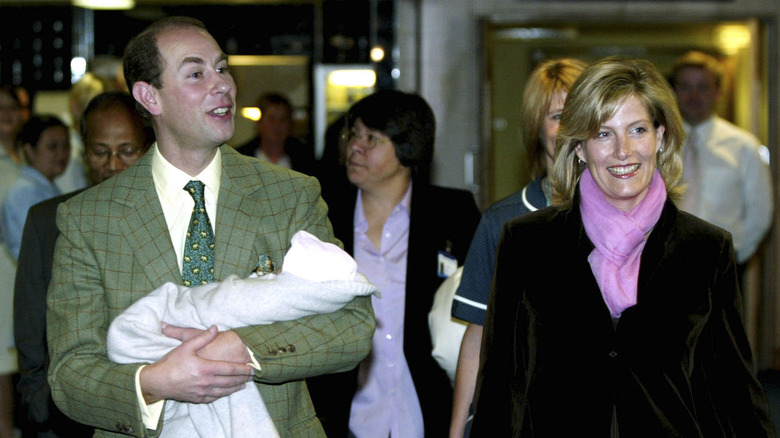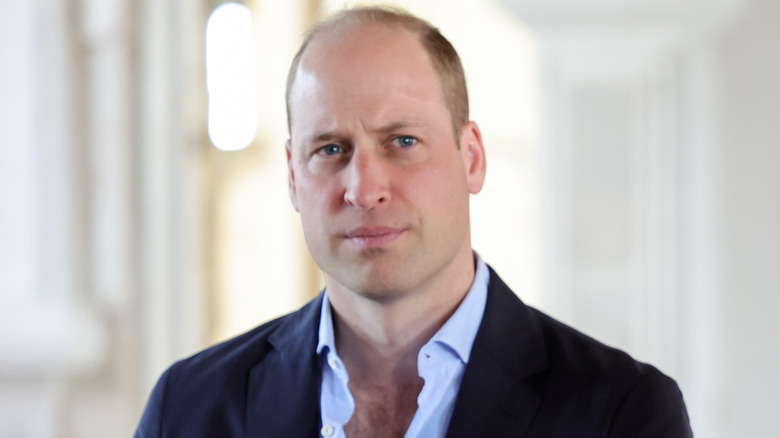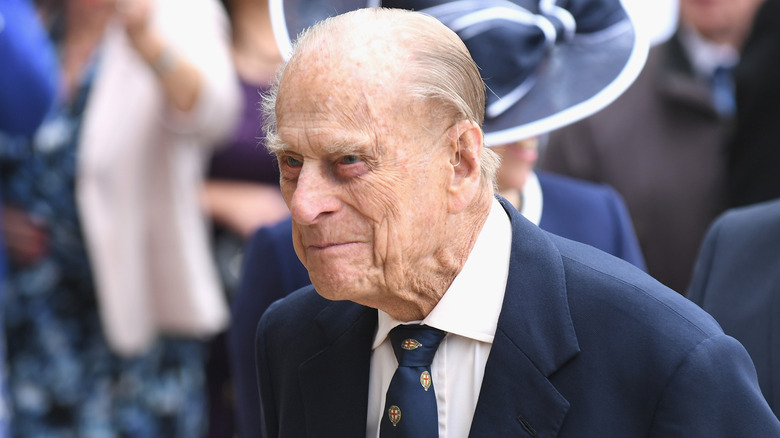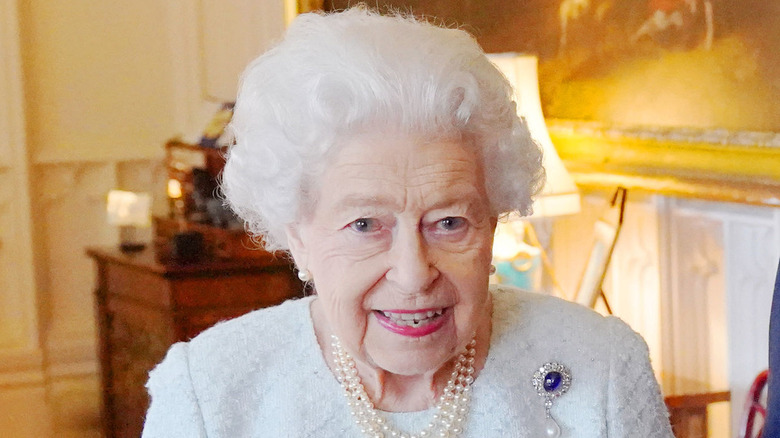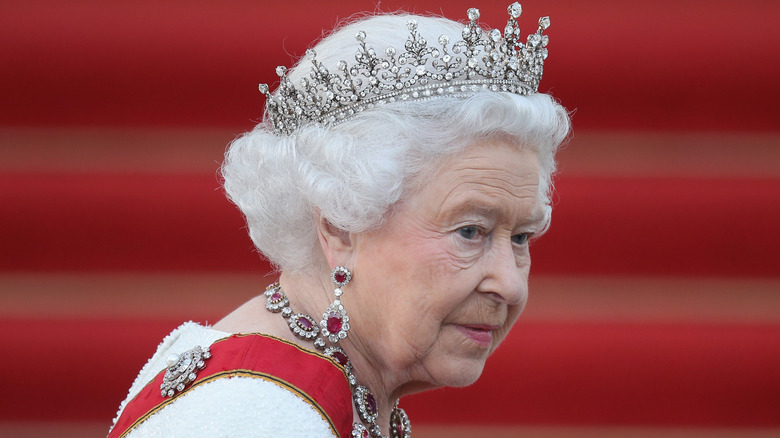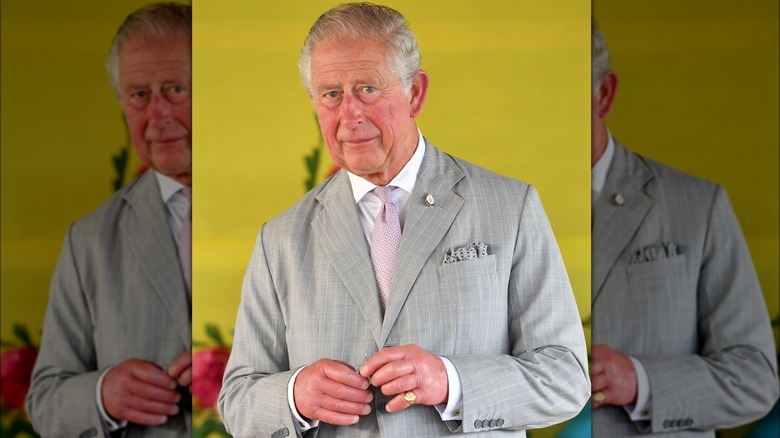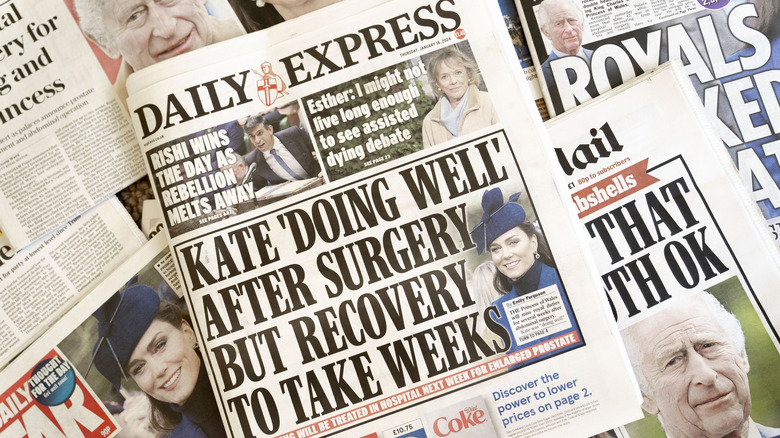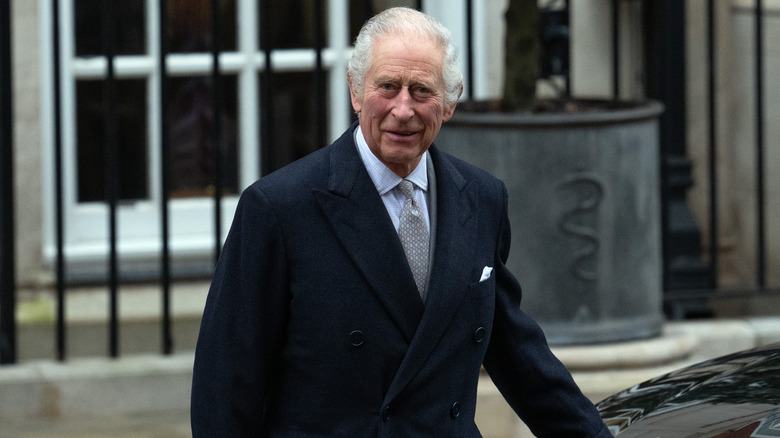Health Issues The Royal Family Tried Keeping Under Wraps
The following article includes mention of mental health and suicide.
While they may possess ridiculous wealth and untold influence in the U.K. and across the world, the royal family are flesh-and-blood humans just like the rest of us. They're born, they die, and along the way they occasionally become ill. When that happens, the public isn't always given the full story.
Over the years, the late Queen Elizabeth II and her family haven't usually been particularly forthcoming about issues related to their health. Hospitalizations, for example, have often been accompanied by purposely vague statements from Buckingham Palace that tend to offer as little information as possible. That tendency has once again come to the forefront, with the first month of 2024 featuring some pretty major medical concerns for Catherine, Princess of Wales, and her father-in-law, King Charles III. In both cases, the palace announcements were as murky as expected, proving once again that — in the case of royal spokespeople, at least — when it comes to informing the public about royals' health, less is more.
King George III's medical maladies caused his 'mad' reputation
King George III has been back in the public consciousness thanks to Netflix's "Bridgerton" spinoff, "Queen Charlotte," which recounts the fictionalized origin story of how the titular queen came to marry her royal husband. George III ruled Britain from 1760 until 1820, a particularly tumultuous time in British history that included the loss of the U.S. colonies after America's victory in the Revolutionary War. In addition to that defeat, the monarch's reign was also characterized by a variety of physical ailments and mental illness — inspiring the 1991 play (and subsequent movie) "The Madness of King George III."
In 1788, the king suffered the first of what would ultimately be four recurrences of a mysterious malady that brought about an array of seemingly unrelated symptoms. These included unpredictable behavior, abdominal pain, a higher-than-normal metabolic rate, and even delirium. Doctors at the time were flummoxed, and the treatments that his physicians recommended — which included bloodletting and restraining the king in a straight jacket — certainly didn't help.
While Buckingham Palace officials tried to keep a lid on it, rumors of George's troubling and even bizarre conduct eventually leaked, leading to his reputation as the so-called "mad king." While the precise nature of King George III's illness will never truly be known, theories that have been floated include porphyria (a blood disorder that can impact the nervous system) and bipolar disorder.
King George VI's doctors hushed up his lung cancer diagnosis
King George VI wasn't destined to become king from birth, but wound up on the throne after the abdication of his older brother, King Edward VIII. George VI — father of Queen Elizabeth II — was a heavy smoker, which resulted in myriad medical issues in his later years. These included a blocked artery in one of his legs (for which he underwent surgery in 1949), and lung cancer, with a malignant tumor removed from his left lung in 1951.
While the late king's lung cancer is commonly acknowledged today, at the time, his doctors kept it a secret – not just to the British public, but also to the king and his family. According to newspaper reports of the time, the king was just fine while recuperating from what was supposedly a successful surgery.
"The King is the best patient I ever had. Not only is he brave, but he is full of humor," royal surgeon Price Thomas declared, as documented by Time, after the 1951 surgery. King George VI died in his sleep just a few months later, in February 1952, at age 56. At the time, his death was attributed to a heart attack, brought about by coronary thrombosis.
Queen Elizabeth II's mentally disabled cousins were institutionalized
Among the various relatives of Queen Elizabeth II were sisters Katherine and Nerissa Bowes-Lyon, the late monarch's cousins, as their father was the queen's uncle on her mother's side. The sisters, born seven years apart (in 1926 and 1919, respectively), both had serious mental and physical disabilities. In 1941 — more than a decade after the 1930 death of their father — both women were admitted to the Royal Earlswood Hospital, a London institution that treated the mentally ill.
However, their very existence was apparently so embarrassing to the British monarchy that the 1963 edition of "Burke's Peerage" — which detailed the family lineage of Britain's aristocrats — described both as being dead since 1940. In fact, the sisters were both alive at that time, but remained institutionalized. The queen reportedly didn't know of her cousins' plight until 1982, when she received a letter from trustees of the hospital. Nerissa died in 1986, at the age of 66, and Katherine was 87 when she died in 2014.
The apparent deception about the sisters' institutionalization only became public knowledge after Nerissa's death when journalists discovered her grave. However, the sisters' niece, Lady Elizabeth Anson, issued a statement at the time insisting their exclusion from "Burke's Peerage" wasn't an attempted cover-up, but that her late grandmother simply hadn't filled out the forms sent to her.
Princess Margaret's depression was kept secret
It's no secret that Princess Margaret, the younger sister of Queen Elizabeth II, didn't exactly have the healthiest lifestyle. Not only was she known to be a prodigious drinker, but she was also a lifelong chain-smoker who reportedly inhaled a staggering 60 cigarettes a day. During the years leading up to her 2002 death at age 71, she was continually dogged by ill health, including hepatitis and several strokes.
While Margaret's late-in-life health woes were eventually made public, her mental health struggles from years earlier was not. In 1996, The Irish Times reported on an excerpt from a biography of Queen Elizabeth II, alleging that Margaret endured a deep depression during the final years of her tumultuous marriage to Antony Armstrong Jones. According to the book, the despondent Margaret told a friend that she was going to hurl herself out of her bedroom window; the friend was so concerned that she contacted the queen; who wasn't terribly concerned, informing the friend that Margaret's room was on the ground floor.
In his book, "Elizabeth & Margaret: The Intimate World of the Windsor Sisters," author Andrew Morton alleged that the royals habitually covered up Margaret's issues involving depression. "Let's face it, Princess Margaret was a depressed person and in the royal family you are not allowed to be depressed," he wrote.
Charles' polo-playing 'tumble' was far worse than the palace portrayed
In 2001, the future King Charles III was playing polo with his sons, Prince William and Harry, when he fell off his horse. News reports at the time downplayed the incident, with ABC News describing the accident as a "tumble." According to a spokesperson, Charles had been taken to a hospital. "We don't think there's been any broken bones but we are waiting for reports from the hospital," the spokesperson stated.
Anyone reading that report wouldn't have assumed his injuries had been severe, but they were. It wasn't until 2006, in a joint interview (via NBC News) with his sons, that Charles revealed the extent of his injuries from that "tumble." He recalled how he fell right on his head and was knocked unconscious. "I ended up being taken to hospital where I finally woke up seemed a long time afterwards, anyway this person here [Prince Harry] told me later that he thought when I was lying on the ground that I was — he said, 'Papa's just snoring' and there I was busily swallowing my tongue and quietly dying."
In Harry's 2023 memoir, "Spare," the Duke of Sussex wrote about his father being advised to do headstands as a way to relieve pain. "Prescribed by his physio, these exercises were the only effective remedy for the constant pain in Pa's neck and back," Harry wrote, as excerpted by News.com. "Old polo injuries, mostly."
Duchess Sophie's childbirth was more life-threatening than the public realized
There was cause for celebration in 2003 when Sophie, Countess of Wessex – wife of Queen Elizabeth II's youngest child, Prince Edward, Earl of Wessex — delivered the couple's first child, Lady Louise Windsor. According to an official royal statement, the baby was born via C-section.
What wasn't known at the time, however, was how difficult and life-threatening the birth had been, for both mother and newborn. When Sophie went into labor prematurely at just 36 weeks, she experienced an acute placental abruption, when the lining of the placenta separates from the uterus. The result was sudden and severe blood loss, with fast-acting doctors rushing to perform an emergency C-section. Due to her extreme loss of blood, Sophie reportedly slipped into a semi-conscious state. Reportedly just 15 minutes away from death, doctors kept her alive with several blood transfusions.
Prince Edward immediately returned to London to be by her side, having been away on a royal visit to Mauritius. He was reportedly shocked to learn she and their daughter had been so near to death, something the British public didn't learn until years later. "It was utterly traumatic, and in some ways Sophie has never got over it," a friend told the Daily Mail of the royal's ordeal.
Prince William's bout of COVID-19 was deliberately kept secret
When the world shut down in March 2020 due to the COVID-19 pandemic, Britain's royal family was not immune. That month, his father — then-Prince Charles — had tested positive for the virus before William subsequently caught it as well.
While Charles had publicly acknowledged his bout with the virus, William did not. He explained why he chose to keep his diagnosis a secret during a subsequent public engagement, as reported by The Sun. "There were important things going on and I didn't want to worry anyone," he reportedly told a patron.
Not only was the public not aware that William was ill with the virus, but what also hadn't been made public was the severity of his illness. "William was hit pretty hard by the virus — it really knocked him for six," a source claimed to The Sun. "At one stage he was struggling to breathe, so obviously everyone around him was pretty panicked." Ultimately, the prince made a full recovery. The following year, he tweeted a photo of himself receiving his first COVID-19 vaccination, clearly intended to encourage others to likewise get vaccinated.
The palace brushed off Prince Philip's hospitalization as 'a precaution'
In 2019, Prince Philip — husband of Queen Elizabeth II — was involved in a car accident. Palace officials subsequently announced that the prince, at the age of 97, would no longer be driving and had relinquished his driver's license, a rare royal acknowledgement of his advancing age.
Two years later, in February 2021, Philip was hospitalized. According to a BBC report at the time, he had been feeling "unwell" for a few days. A Buckingham Palace spokesperson insisted that he was only admitted to hospital simply "as a precautionary measure." Other than that, he was reported to be "in good spirits." He wound up remaining in the hospital for four weeks, reportedly being treated for an infection and also undergoing a procedure to address a pre-existing condition with his heart (he previously underwent a procedure for a clogged artery in 2011).
Less than a month later, an official statement announced that the Duke of Edinburgh died at the age of 99. "His Royal Highness passed away peacefully this morning at Windsor Castle," noted the statement. While there was certainly nothing suspicious about an elderly man dying mere weeks before his 100th birthday, whether his hospitalization weeks earlier was connected to his death remains a matter of speculation.
The public was unaware of Meghan Markle's deep depression
Britain's royal family has included no shortage of scandalous figures over the years, yet it's arguable that none of them ever managed to generate a higher degree of controversy than Meghan Markle. After she and husband Prince Harry broke from the royals in 2020 and moved to California, the couple made headlines with their scorched-earth, highly-rated 2021 interview with Oprah Winfrey.
As Markle revealed, the negative press she had been experiencing and the chilly reception from the royals had crushed her — to the point that she contemplated suicide. "Look, I was really ashamed to say it at the time and ashamed to have to admit it to Harry especially, because I know how much loss he has suffered, but I knew that if I didn't say it, then I would do it," she later confessed during a gala speech, as reported by Town and Country Magazine. "I just didn't want to be alive anymore."
During the interview with Winfrey (via Today), Markle disputed claims that a dispute with Catherine, Princess of Wales – reportedly about what dresses the flower girls would wear at her wedding — had driven Middleton to tears. According to Markle, it was her, and not her future sister-in-law, who was the one left crying. "It made me cry, and it really hurt my feelings," Markle insisted.
Buckingham Palace tried to hide Queen Elizabeth's 2021 hospitalization
Even when she was well into her 90s, Queen Elizabeth II was depicted as being as fit as a fiddle and healthy for a woman of her age — but how much of that common public perception was actually true? That was a question raised in October 2021, when Her Majesty's scheduled royal visit to Northern Island was delayed at the last minute.
According to a statement from Buckingham Palace, the 95-year-old monarch's doctors had advised her to put off the trip and take it easy. Initially, no reason was given, with the implication being that she was simply feeling a bit run down or possibly under the weather. "The queen has reluctantly accepted medical advice to rest for the next few days," read the brief statement, as reported by The Guardian.
However, news subsequently emerged that the queen had actually been hospitalized, despite the earlier missive claiming she was resting at Windsor Castle. Whatever caused her hospitalization was apparently not too serious; after staying in hospital overnight to undergo some tests, she returned home the following day. As the Daily Mail pointed out, that wasn't the first time that palace officials had misled the public about a health-related issue involving the queen. Back in 2018, she secretly underwent cataract surgery, which wasn't confirmed until nearly a month later after she was photographed uncharacteristically wearing sunglasses on several occasions.
Unconfirmed rumors claimed Queen Elizabeth was undergoing cancer treatment
The death of Queen Elizabeth II in September 2022 made news throughout the world given her status as one of the world's most famous people throughout her 70-year reign. That said, the fact that she was 96 at the time of her death rendered the news more inevitable than shocking.
While her death certificate designated old age as the cause of her passing, a purported friend of both Prince Philip and the queen claimed to have inside information indicating that there may have been another factor. In his book, "Elizabeth: An Intimate Portrait," author Gyles Brandreth claimed he had it on good authority that the queen had been diagnosed with bone cancer, which had been kept top secret by Buckingham Palace. "[It] would explain her tiredness and weight loss and those 'mobility issues' we were often told about during the last year or so of her life," he wrote, as excerpted by Newsweek. An anonymous source seemingly backed up Brandreth's claims. "The secret of her failing health was well guarded, but she had actually been very unwell for a lot longer than most people knew," the source told the Daily Beast.
Whether or not the queen did have bone cancer, however, is a matter of speculation. As Dickie Arbiter, the queen's former spokesperson, told Newsweek, Brandreth had been given "secondhand" information that may not necessarily have been true.
King Charles's fingers hinted at secret health issues
In addition to all of the injuries that King Charles III has experienced over the years from polo, there's another malady he apparently deals with. That is evident in the monarch's hands and his swollen, puffy fingers. Charles is not unaware of his digits' condition; In the BBC documentary "Charles III: The Coronation Year" (via The Independent), the king jokingly compared his hands to that of his son, Prince William, quipping, "No, you haven't got sausage fingers like mine."
Those self-proclaimed "sausage fingers" are likely the result of an underlying medical condition — one that has not been divulged to the public. According to British physician Chun Tang, there are several reasons why the king's fingers are so swollen, which is officially named dactylitis. "This condition arises due to inflammation and can be a result of arthritis, multiple bacterial infections or even TB," Tang told the Daily Mail. "Other possibilities include high salt levels, allergic reactions, medicinal side effects, injury and autoimmune diseases."
All of these underlying causes can be treated, but only if it has been determined which is responsible for the enlargement. While the public has yet to learn the cause of the king's swelling, there has been speculation that a renewed focus on his hands led Charles to hide them in his pockets whenever he's photographed.
The circumstances of Kate Middleton's surgery have been kept vague
Catherine, Princess of Wales, who will eventually become Queen Catherine when her husband eventually ascends to the throne of England, has long been known for her fitness and athleticism. Despite that, she hasn't been entirely immune from health woes. In January 2024, the princess was admitted to a London hospital for what was described by a palace spokesperson (via USA Today) as a "planned abdominal surgery."
At the time, her recovery was estimated to take a while, and she wouldn't be returning to her royal duties until after Easter nearly three months later. 13 days after entering the hospital, she was discharged. As is typically the case with the oh-so-private royals, the precise nature of her surgery was not made known. However, People reported that whatever it was, it was not cancer-related.
While the public was surprised by the abrupt news of her surgery, the same held true for Middleton's friends and colleagues. According to People, she had kept all information about the impending surgery to herself, with friends reportedly having no knowledge that she was planning to go under the knife. In addition, even those working on a close basis with the royals were kept in the dark about the surgery.
King Charles's cancer diagnosis was long hidden before its reveal
Weeks after Catherine, Princess of Wales, returned home after undergoing surgery, Buckingham Palace had further health-related news to share. According to their statement, King Charles had surgery for an enlarged prostate — a benign condition — when doctors discovered another medical issue. "Subsequent diagnostic tests have identified a form of cancer," read the statement.
Charles was reported to be receiving treatment and was following his doctors' advice to postpone all public activities. He would, however, continue his duties as head of state, including paperwork and his regular weekly meetings with British Prime Minister Rishi Sunak. "He remains wholly positive about his treatment and looks forward to returning to full public duty as soon as possible," continued the statement. "His Majesty has chosen to share his diagnosis to prevent speculation and in the hope it may assist public understanding for all those around the world who are affected by cancer."
If there was a silver lining, it was that Charles's health scare reportedly thawed his frigid relationship with Prince Harry, who had flown to London from California to visit his ailing father. When asked about the king's prognosis while interviewed by "Good Morning America," Harry responded, "That stays between me and him."
If you or anyone you know needs help with mental health, or is in crisis, contact the relevant resources below:
- Contact the Crisis Text Line by texting HOME to 741741, call the National Alliance on Mental Illness helpline at 1-800-950-NAMI (6264), or visit the National Institute of Mental Health website.
- Call or text 988 or chat 988lifeline.org.

